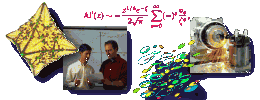Using Simple Stochastic Differential Equations to Solve Complicated Partial Differential Equations
Michael Mascagni
Florida State University, Department of Computer Science
Wednesday, October 18, 2006 11:30-12:30,
Building 225, Room B111
Gaithersburg
Wednesday, October 18, 2006 09:30-10:30,
Room 4550
Boulder
Abstract:
This talk begins with an overview of methods to solve partial differential equations (PDEs) based on the representation of point solutions
of the PDEs as expected values of functionals of stochastic processes defined by the Feynman-Kac formula.
The particular stochastic processes that arise in the Feynman-Kac formula are solutions to specific stochastic differential equations (SDEs) defined
by the characteristics of the differential operator in the PDE.
The Feynman-Kac formula is applicable to a wide class of linear initial and initial-boundary value problems for elliptic and parabolic PDEs.
We then concentrate our attention on elliptic boundary value problems that arise in applications in materials science and biochemistry.
These problems are similar in that the PDEs to be solved are rather simple, and hence the associated SDEs that arise in the Feynman-Kac formula
are likewise simple.
However, the geometry of the problem is often complicated and amenable to several acceleration approaches particular to these simple SDEs.
We will specifically describe the walk on spheres, Greens function first passage, last passage, walk on the boundary,
and walk on subdomains methods in this context.
These methods will be presented in the setting of several applications studied by the author and his research collaborators.
Speaker Bio:
Professor Mascagni received his PhD in Mathematics in 1987 from the Courant Institute of Mathematical Sciences
on the topic of negative feedback in neural networks.
He joined Florida State University in 1999 after experience with both the National Institutes of Health and the Institute for Defense Analyses.
His current research interests include computational science, mathematical biology, Monte Carlo methods, numerical analysis,
parallel/distributed/grid computing, random number generation, and software engineering.
He is a member of the Association for Computing Machinery (ACM), the Society for Industrial and Applied Mathematics (SIAM),
and the International Association for Mathematics and Computers in Simulation (IMACS).
Presentation Slides: PDF
Contact: P. M. KetchamNote: Visitors from outside NIST must contact
Robin Bickel; (301) 975-3668;
at least 24 hours in advance.
|




